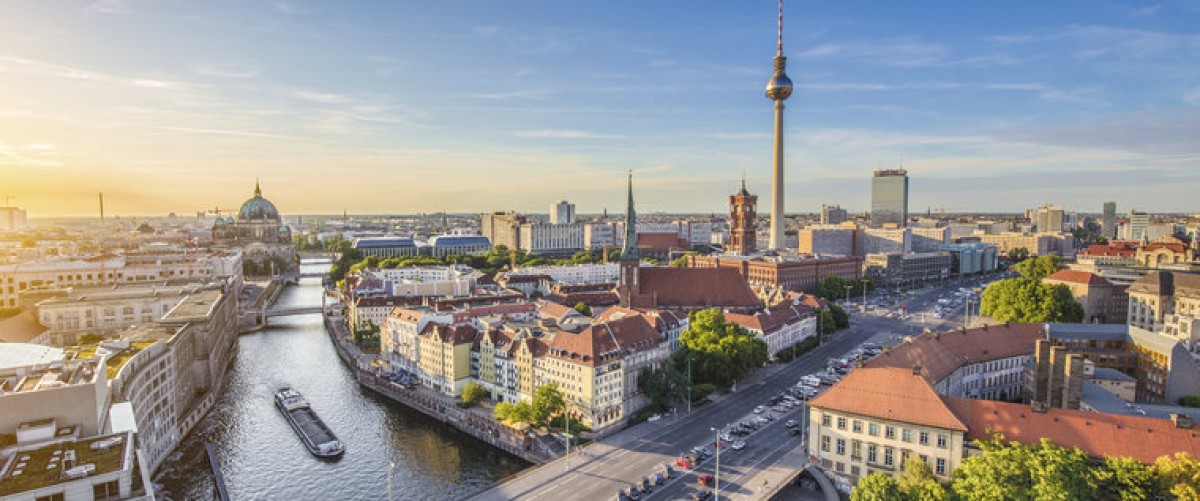Berlin’s World of Third Wave Coffee

On a hazy Autumn Tuesday afternoon, you wander into the blogger-acclaimed coffee shop you saw on Instagram. There’s bare brick, bare plaster, house plants and big gleaming machines. Every table is taken by someone engrossed in something on the screen of a sticker-covered Macbook or a thick, glossy table top magazine. The familiar hisses, bangs and grindings of espresso coffee fill the air around you. The menu boards are almost overwhelmed by the number of names, bean types, brewing methods and milk alternatives. The people behind the till are almost viciously cool looking and there’s a sign saying ‘cash only, please.’ After being asked to repeat your order again, ‘auf Englisch,’ you smile to yourself and think, ‘yep, this is Berlin.’
You really can learn a great deal about the people of Berlin when you step inside one of its third-wave coffee shops. ‘Third-wave,’ by the way, indicates a different approach to coffee; one which treats it more like wine or artisanal foods. Something to be cultivated and indulged in. It’s all about sensations and enhancing consumption experience. It’s from here we get notions like single-origin coffee, flavour profiles and ‘bloom.’
In few other capital cities would you see so many people sat about drinking coffee in the middle of a weekday. But Berlin isn’t like other capital cities. Berlin isn’t really like anywhere. Sure its trendy, indy, anarchic reputation may have faded somewhat at this point, but it’s still oddly special. The volume of cafe customers as you wander in at 2pm tells you something major: the traditional 9am to 5pm office job is not something that applies to much of Berlin’s workforce. They choose instead to work in cafes at hours that suit them. Germany’s financial hubs are found elsewhere, in Frankfurt and Dusseldorf. Instead, Berlin is home to legions of start-ups, digital agencies and artists. Just by being there Berliners give you a clue about their attitude to tradition and convention. These coffee drinkers are non-conformists. They choose their own hours and make their own rules.
No one looks up at you as you walk in or find a table. This is something that really struck me during my time in this city. Berliner nonchalance goes beyond a respect for privacy - already alien to someone like myself who’s grown up surrounded by nosey Brummies. They are uninterested in the actions of others. It doesn’t concern them. This goes a long way in explaining the vast diaspora of appearances and lifestyles one witnesses daily in the city. All red latex on a Thursday morning? Sure. Unicycle to work? Why not! Sing karaoke to ‘My Heart Will Go On,’ on the U-Bahn except with lyrics that you’ve made up yourself and don’t actually consist of any real words? Go for it. Berliners don’t care. This city operates on the maxim of ‘you do you.’ People can experiment and ‘live their truth,’ by and large without fear of anyone staring.
This disinterest is a big part of the reputation Berlin developed for itself as a haven for the misfits, live wires, and renegades of the world and stems from a reverence for privacy. Until 1989 Berlin was divided and the east was ruled by a communist administration bolstered by the Stasi, or secret police. It was made up of countless ordinary citizens acting as agents out of loyalty, ambition and fear. Subsequently people learned to protect themselves. Private conversations were never had in restaurants or on public transport - indeed, public transport in East Berlin remains largely silent even today. Having had it threatened for so many decades, more than most Europeans, Germans view their privacy as entirely sacred. How does this relate to their coffee habits you ask? Remember the ‘cash only’ sign? Unlike in the UK that doesn’t have anything to do with admin fees. Instead, it comes from a desire to protect personal data. Roughly 79 percent of German financial transactions are settled with cash. For context that figure for the UK is less than 50 percent. Cash is anonymous. It leaves no trail. It doesn’t tell big faceless businesses anything about you or your spending habits. The German word for data protection is synonymous with the word for privacy and you can see that in their coffee culture.
From spending habits, to work-life balance, to their cool nonchalance, you really can tell a great deal about Berliners from their coffee culture. Is it pretentious? Yes, of course, but that’s just another part of what this city represents. This is a trendy, relaxed hive of subversive activity, and you really can tell all that from an afternoon in a coffee shop.

